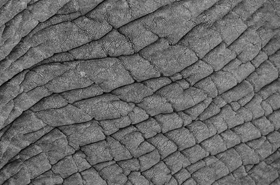When a story is true in one world, it is sometimes true in another. My people are travelers; we have been traveling a long time. It is becoming more difficult; so many places are now narrow places to us.
I am the clan mother. I am called daughter of a tree. Maybe because my legs are like trees. Maybe because we depend on trees for so much. We eat their leaves; we scratch our backs against their bark; we dig among their roots; we rest in their shade. Sometimes we dig trees up, but it makes room for new growth. Water collects in our footprints. Turned earth settles around the seedling. No wonder our people call us mothers “useful trees.” We have places along our route where our people come to die, people of many clans, and where their bones rest. When our journey brings us here again, we find our loved ones’ bones among the bones of many. We know the ones we love even in their bones. We pick them up, we touch them and we remember. Distant peoples who understand nothing else of us, understand this: we never forget.
I am the clan mother, so I remember most of all. It was I who found my uncle’s bones, my uncle, the dreamer. Then we all picked them up in love. Some stories say we carried them with us. That is true, but it was in our memories we carried them.
Once long ago, my grandfather, the lame one, the seer, the one who saw people in the sky, was sick with sadness. He thought he had lost his favorite son, my uncle. It was I who sang to him and let him know that his son lived. It was not a song that you people could hear. It was like a deep rumbling under the earth. Like a purr. Just joy, just joy.
Remember us, as we remember. We mothers who keep our daughters close; who have nineteen words for our daughters for every three we have for our sons. We who have so many exiles and so few return. But when we reunite we have such joy. We flap our ears and we pound the ground. We are so big and we touch each others’ mouths so gently with our trunks, we touch the songs in each others’ mouths.
Remember us. As we remember us. Remember us on the journey.
Notes:
Serach bat Asher, in Jewish tradition, becomes a woman of memory and wisdom, traveling through the centuries and the many Jewish Diasporae to help her people in need. Her name “bat Asher” means daughter of the tribe of Asher, but it can also be understood as “daughter of a tree.” In the Torah, Joseph dies and is buried in Egypt, and just before his death he demands that his descendants remember him by bringing his bones with them into the new Land. According to the rabbis, it is Serach bat Asher alone several centuries later who remembers the place in the river Nile where Joseph’s bones have been buried. The rabbis note that she is listed at the end of Genesis among the family accompanying Jacob in Egypt, and listed again in Numbers among the people entering Zion. Serach bat Asher remembers, they conclude, because she has been alive all this time, blessed with eternal life by Jacob for being the one to tell him that Joseph was still alive. She arrives in times of difficulty, unrecognized. In many ways she is like Elijah, but her gifts are specifically knowledge, sense, wisdom and most of all memory.
About the Author

Mei Mei Sanford – is a writer, storyteller, teacher and woodcarver. She was ordained as a Kohenet by the Hebrew Priestess Institute in the particular roles of story teller and shapeshifter. She is also the Iyalode Osun of Iragbiji, Nigeria. She teaches in the Africana Studies program at the College of William and Mary. She co-edited with Joseph Murphy Osun Across the Waters: a Yoruba Goddess in Africa and the Americas. She is currently completing a young adult, Jewish mystical, queer, historical novel tentatively titled Lioness on the Ark.
She writes: “As I worked on this piece, I read research somewhere about mother elephants’ language including ‘nineteen words for our daughters for every 3 we have for our sons.’”
Return to top